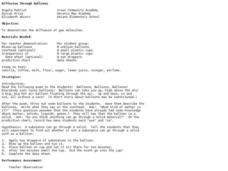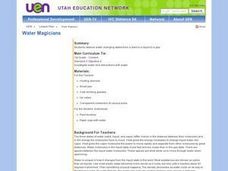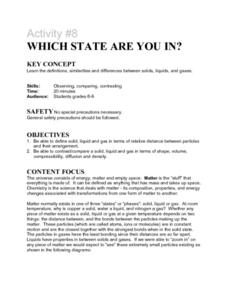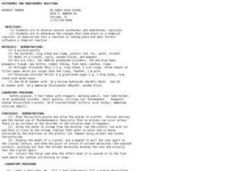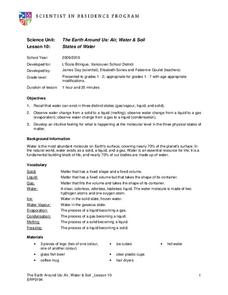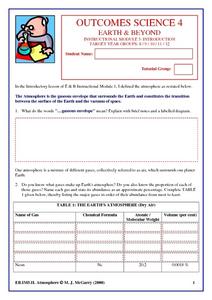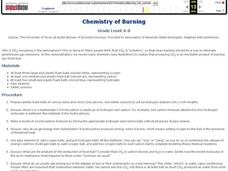Curated OER
The Physical Behavior of Matter
Students distinguish between three phases of matter: solid, liquid and gas, on the molecular level. They compare and predict the relative compressibility of the three phases of matter through journal writings and drawings.
Curated OER
Diffusion Through Balloons
Students observe the diffusion of air molecules through a balloon. In this chemistry and molecules lesson, students fill balloons with air and a scented substance and observe whether the scented air is able to permeate the balloon.
Curated OER
Chemistry Practice
In this chemistry overview worksheet, students calculated the volume of different gases and liquids given in a word problem. Students had to calculate the molecular mass and write the empirical formula and the molecular formula.
Curated OER
WS 7.2 Kinetic Theory-Temperature and Volume
In this kinetic theory worksheet, students answer questions about kinetic energy, they calculate volumes of gases at STP, they answer questions about temperature and they convert from one unit of temperature to another.
American Chemical Society
Changing State: Evaporation
Why do experiments require a control? Guide scholars through designing an experiment to see what they can do to evaporate water faster with a lesson that stresses the importance of controlling all variables. The second activity allows...
American Chemical Society
Changing State: Freezing
There are five types of frost: ground frost, air frost, hoar frost, glaze, and rime. Scholars mix ice and salt in a metal container to observe frost forming on the outside of the can. Animations and videos enhance the learning.
Curated OER
Water Magicians
First graders observe water changing states from a solid to a liquid to a gas. They predict what they think happen to ice cubes as they sit out. They paint water with paintbrushes outside the classroom in the sun and watch the water...
Curated OER
Activity #8 Which State Are You In?
Young scholars define, give similarites and differences between solids, liquids, and gases. They compare and contrast a solid, liquid and gas in terms of shape, volume, compressibility, diffusion and density. Pupils classigy common...
Curated OER
Somethin' Sweet
Young scholars make their own candy. In this science lesson plan, students observe how molecules interact with each other in physical changes and observe how the addition of heat can cause molecules to interact and form new molecules in...
Curated OER
The Mole
Students investigate moles and Avogadro's hypothesis. In this moles lesson plan, students complete a worksheet by finding the volume of 1 mole of each substance given its density and they find the number of molecules, the formula, the...
Curated OER
Convection and Wind
Learners use water, beakers, hot plates, paper dots, and goggles to participate in a hands on activity where they see how a convection current creates wind. In this convection current lesson plan, students participate in a hands on...
Curated OER
The Nature of Chemical Change: Acting Out An Example
Young scholars illustrate the molecular nature of matter and show that chemical change involves alteration of molecules.
Curated OER
Selling The Molecular Kinetic Theory
Students investigate molecule movement according to the kinetic molecular theory. In this kinetic molecular theory lesson plan, students observe demonstrations showing that molecules speed up with increasing temperature and slow down...
Curated OER
Physical and Chemical Properties of Matter
Students identify the physical and chemical properties of matter. They review the types of matter. Students list the four states of matter (Solid, Liquid, Gas and Plasma). They recognize and describe the different types of matter.
Curated OER
Photosynthesis Explored
Students observe the production of gas as an effect of photosynthesis. In this biology lesson, students perform an experiment with pondweed and make measurements and predictions about photosynthesis and the plant.
Curated OER
Exothermic and Endothermic Reactions
Students observe demonstrations of exothermic and endothermic reactions and determine the changes that take place in a chemical reaction. Students observe four demonstrations showing entropy, attraction of molecules due to polarity,...
Curated OER
Bhopal - Covalent Bonding
Using the chemicals that leaked in the Bhopal gas tragedy of 1984, chemists examine covalent bonds. Provide for them the chemical reactions and have them draw Lewis diagrams for the molecules involved. That's about all there is to the...
Curated OER
States of Water
Students investigate the 3 states of matter. In this physical science "matter" lesson, students observe and participate in a number of demonstrations involving melting and freezing water. Students observe the effect heat has on changing...
Curated OER
Matter in Motion
Second graders examine matter, what it is and what the different states are. In this matter lesson plan students view The Magic School Bus Meets Molly Cule and answer questions.
Curated OER
Earth and Beyond
In this earth and beyond worksheet, students answer short answer questions about the atmosphere, the chemical compounds in Earth's atmosphere. Students visit different websites to conduct research of the discoveries of the scientist who...
Curated OER
From Molecules to Mole Day Do's
Students recognize methods used to define the mole. After converting various quantities to the mole, students provide a context for understanding the usefulness of scientific notation and the mole.
Curated OER
The Great Gas Race
Fourth graders improve their understanding of Graham's Law by using properties of gases to evaluate the rate of effusion of two compounds as they vaporize. They engage in a lab which elevates their understanding of the properties of gases.
Utah LessonPlans
Water Magicians
Students observe water changing states from a solid to a liquid to a gas.
Curated OER
Chemistry of Burning
Young scholars look into the increase of carbon dioxide in the atmosphere. In this chemistry lesson, students look at the hydrocarbon molecule through a model and see what happens when energy is released. They watch as the water vapor...



